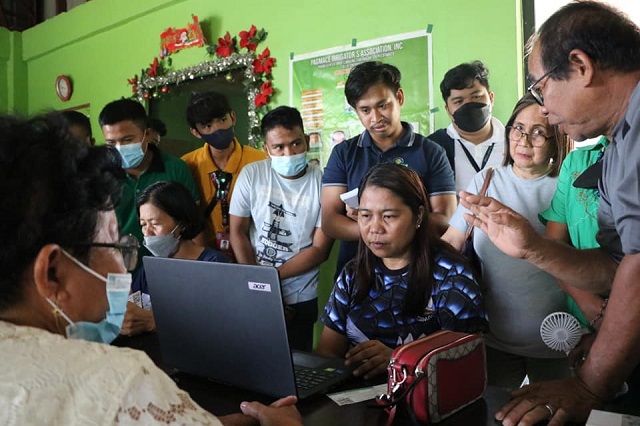
The Department of Agriculture – Philippine Rice Research Institute (DA-PhilRice) continues to explore digital solutions to improve certified seed distribution under the Rice Competitiveness Enhancement Fund (RCEF) Seed Program.
Recently, the institute through its RCEF unit at DA-PhilRice Midsayap pilot-scaled its pre-registration initiative in Brgy. New Iloilo, Tantangan, South Cotabato. Verified farmer-beneficiaries registered and submitted their farming-related profile via the RCEF Seed Program website days prior to distribution. They can expect faster transactions during the actual seed date of distribution, which will be scheduled by their municipal agriculture office.
The pre-registration scheme was first tested in Candaba, Pampanga early this year.
“The scheme is farmer-facilitated and straightforward. Farmers who were provided with the RCEF Farmers’ ID can input their profile, preferred variety, rice area, and target date of planting through our website. They can do this anywhere using a smartphone or a computer, hopefully with the help of their tech-savvy children. Once they complete the needed information, they will receive a QR code, which they will present during seed distribution in an ‘express lane’,” Flordeliza H. Bordey, DA-PhilRice RCEF Program Management Office (PMO) director, explained.
By pre-registering, the distribution process is expected to be streamlined and farmers’ queues and waiting time are reduced.
“This can help us easily monitor the status of every farmer’s allocation. It is also easier and faster than the regular distribution process,” Lolita Derequita, one of the farmers who experienced the pre-registration scheme from Tantangan said.
According to Bordey, the pre-registration is an improved version of the Binhi e-Padala System, which is also a digitally-aided distribution mechanism launched in 2020. Here, qualified beneficiaries receive a claim code via text message, and they present it when receiving seeds. The system was proven effective in cutting lines during seed distribution and hastened financial transactions between DA-PhilRice and its partner-seed growers.
RCEF PMO Field Operations Unit Head Rizal G. Corales noted the initiative aims to capacitate farmer cooperatives and associations (FCAs) and provide support to the local government units (LGUs).
“FCAs can be tapped as key partners in ensuring that seeds become more accessible to farmers. It will also help ease the burden on the part of the LGUs who are currently leading RCEF seed distribution efforts,” he added.
Tantangan Mayor Timee Joy Torres-Gonzales participated in the pilot-scaling and assisted farmers as they learned the ropes of the scheme.
“The agriculture sector needs to step up and make use of available technologies to ensure [the] continuous food supply of the country,” she noted.
The pre-registration process will be further tested in other areas of the country in the coming months.
The RCEF Seed Program is a component of Republic Act 11203 or Rice Tariffication Law, which allocates P3 billion in funds every year to develop, propagate and promote high-quality rice seeds to help improve the competitiveness of Filipino rice farmers. LGUs and lawmakers assist in its implementation.




